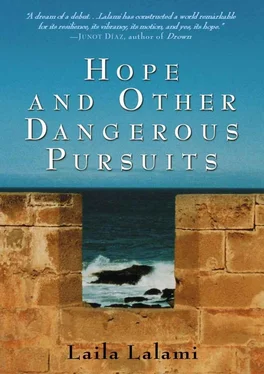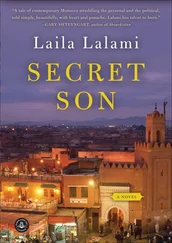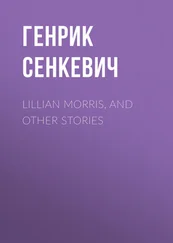Halima took a sip of her tea. She shook her head. There had been no miracle for her mother, and maybe there was none for her. Still, even if she were to believe those people who said she’d dreamt up the stick and the rescue, she couldn’t bring herself to brush off Maati’s change of heart. Only a miracle could make that man give her back her freedom. Sometimes, Halima thought, it was better to surrender to things one didn’t understand. Her son Farid had given her back her life. Twice. She had to accept that he was different.
That night, when she and the children went to bed on the mat, she lay on her side, staring at him for hours, reliving his young life in her mind. She wondered if there was some other miracle she’d missed because she wasn’t paying attention. There was the time when she was walking with him, hand in hand, on their way to the Lakrie market. A motorist made a sharp turn just as she’d stepped off the sidewalk, and his Honda careened toward her. Farid had pulled her back just in time. She’d stood on the pavement, her legs wobbling under her, one hand resting on Farid’s shoulders and one on her chest, as though that could quiet the beating of her heart.
She closed her eyes and turned to lie on her back. This boy of hers was a mardi, a blessed child.
KHADIJA, THE NEIGHBOR, was the first to ask. She came to the house one evening, dragging her son Adnan by the hand, forcing him to sit next to her on the mat. She was quiet while Halima made her a pot of tea, using whatever mint and sugar she had left. Farid sat with them while his brother and sister played a string game, making shapes that resembled beds or boats, passing the string back and forth. Halima served the tea, and after the customary small talk, Khadija fiddled with the ends of her housedress, bit her lip, and asked for the favor. She said her Adnan was about to take his grade school exams, that he needed help, a bit of luck. “He already flunked last year,” she said. “If he flunks again this year, they’ll expel him. Can you imagine, ya Halima? What will I do with him if he doesn’t go to high school?” She slapped her cheek for good measure.
“Why don’t you keep him home and make him study?” Halima asked, irritated with Khadija for making such a demand. Everyone knew that Adnan had a habit of skipping school to play football on the street.
“But maybe your son can give him a blessing,” Khadija insisted. “Didn’t you say that he saved your life? Didn’t you say that he saved your children’s lives?”
Halima nodded, regretfully. Farid rested his head against her arm, as if to comfort his mother for her mistake. She held her palms open before her. “He is only a little boy,” she said. “Besides, if he could accomplish miracles, would we be living this way?”
“Let Farid bless my son,” Khadija said. “Let him bring us some luck.”
“If Adnan studied, he wouldn’t need any luck,” Halima muttered. Khadija didn’t answer. Instead she gave Halima a wounded look. The silence grew heavy, imposing, yet Khadija didn’t make any attempt to leave. At last, Halima nudged Farid. He put out his hand, touched Adnan’s head, all the while looking away. His first blessing and already an unwilling saint.
HALIMA WAS WASHING the dishes when Farid came up to her. “Is it true?” he asked.
“What?”
“That I’m a saint?”
“Curse Satan, child,” she said, shaking her head. “That woman is crazy.” She picked up the tray and rinsed it. “Don’t forget to take the trash out.”
“So why did you ask me to touch her son?”
“Because that was the only way I could get her to leave. Didn’t you see?”
Farid nodded.
“You don’t mind, do you?” Halima said, reaching out to smooth her son’s hair. “It can’t hurt, right?”
Farid shrugged. “No.”
“At least, this way, she went home happy.”
Farid took the trash and walked quietly out. From the kitchen, Halima heard Amin and Mouna teasing him about the blessing. “Touch my nose,” Mouna said, laughing. “I think it’s running. It needs a little baraka.”
“How about my butt?” said Amin. “Maybe my farts will smell like perfume.”
Farid slammed the door, but their laughter didn’t stop.
EVEN WITH A saint at home, Halima still had to make a living. Her mother had told her about a janitorial job twice a week at a lawyer’s office, but when she went to ask she was told that the position had already been taken. So she started selling beghrir at the market. Every year, when people tasted the beghrir she made for Eid, they would compliment her on how fluffy they turned out. Occasionally she’d make a batch of millefeuilles to entice students going back home from school. She enjoyed working for herself and was good at sales. Things were working out after all, she thought. Sometimes, on her way home from the market, she’d find Adnan playing on the street and she’d drag him by the ear all the way to his house, telling him that he’d received a blessing and he shouldn’t waste it on football. Before long Adnan would run home as soon as Halima turned the corner of the street, her raffia bag balanced on her head.
One day in June Halima and her children came home to find Khadija waiting for them, a qaleb of sugar tucked under her arm. Her son had somehow passed his exams, and so she gratefully pressed the qaleb into Halima’s hand. Halima murmured her congratulations and turned to put her key in the lock. Khadija didn’t go away. She stood so close that Halima could feel the woman’s warm breath against her neck. Halima lowered the raffia bag and held it against her hip. “Adnan must have worked hard,” she said. Khadija didn’t seem to have heard. She kept staring at Farid, an awed look on her face. Halima pressed her son’s shoulders and guided him and his brothers inside the house before turning back to Khadija. “Uqbal next year. Insha’llah he’ll have the same success.”
Halima closed the door and heaved a sigh. “Now she’s going to want more,” she said. “And she’s going to tell others.”
Farid was already peeling the blue paper off the cone of sugar. He broke off three pieces and gave one each to his brother and sister before putting one in his mouth. He grinned. “You said it didn’t hurt.”
A WEEK LATER, Halima was mixing the dough for beghrir when she heard a knock. Mouna opened the door. Halima’s mother, Fatiha, shuffled in, leaning on her cane.
“What are you doing here?” Halima asked, getting up.
“Can’t I see my own grandchildren?” Fatiha answered, an indignant look in her eyes. “You never bring them around anymore, so your poor mother has to take the bus all the way here to see them.” She took off her jellaba and sat down on the mat.
Halima was afraid of what the unexpected visit might mean. Would her mother try to convince her once again to go back to Maati? Would she ask her to stop selling food at the market and get a proper job? Whatever it was, Halima knew the visit could not mean good tidings. “Go play outside,” she told the children.
“Wait,” Fatiha said. She rummaged for something in her purse, pulled out a handful of sweets. “I brought some candy for them.” Amin and Mouna rushed to get their shares, noisily unwrapping the sweets, comparing colors and flavors.
“Have some, Farid,” Fatiha said, stretching her crooked hand open for her grandson.
The boy shook his head. “I don’t feel like having candy.”
“Well, at least come closer, let me look at you,” she pleaded.
“I’m just going to play outside.” He grabbed the deflated football and took off, trailed by his siblings.
Fatiha clicked her tongue. “Bad manners,” she said.
“Can you never say anything positive?” Halima asked. It was just like her mother, she thought, to find fault with three sweet children like Mouna, Farid, and Amin. Fatiha pursed her lips and stayed quiet for a while, watching as Halima poured some batter onto the stone griddle.
Читать дальше












